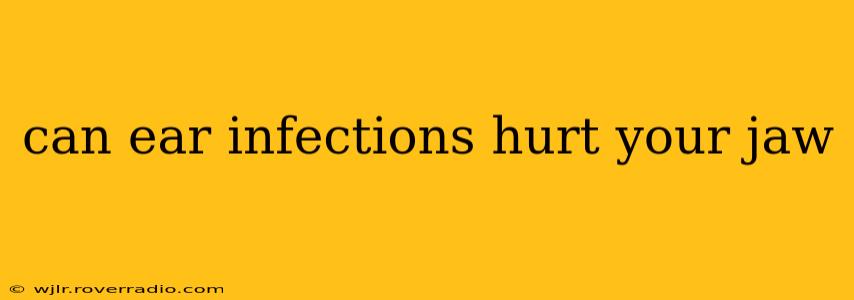Ear infections, while primarily affecting the ear, can sometimes cause referred pain that radiates to other areas of the head and neck, including the jaw. This isn't because the infection itself has spread, but because of the complex network of nerves in this region. Understanding this connection is crucial for proper diagnosis and treatment.
How Can an Ear Infection Cause Jaw Pain?
The pain you feel in your jaw isn't directly caused by the infection in your ear. Instead, it's a result of referred pain. This phenomenon occurs when pain signals from one area of the body are misinterpreted by the brain as originating from another area. The trigeminal and glossopharyngeal nerves, responsible for sensation in the face, jaw, and ear, are closely intertwined. Inflammation and irritation in the middle ear, often associated with an ear infection (otitis media), can stimulate these nerves, leading to the perception of pain in the jaw.
What Does Jaw Pain from an Ear Infection Feel Like?
The jaw pain associated with an ear infection can vary in intensity and type. Some individuals experience a dull ache, while others describe a sharp, shooting pain. The pain may be constant or intermittent, and it might worsen with chewing, yawning, or touching the jaw. It's important to note that this pain is often accompanied by the classic symptoms of an ear infection, such as:
- Earache: A persistent ache or throbbing pain in the affected ear.
- Hearing loss: Temporary or partial hearing loss in the infected ear.
- Fever: A fever, often accompanied by chills.
- Feeling of fullness in the ear: A sensation of pressure or blockage in the ear.
- Drainage from the ear: A discharge of fluid from the ear, potentially pus-like.
Can Other Conditions Cause Similar Jaw Pain?
It's crucial to remember that jaw pain can stem from various sources, and an ear infection is just one possibility. Other conditions that can mimic ear infection-related jaw pain include:
- Temporomandibular joint (TMJ) disorders: These disorders affect the joint connecting the jawbone to the skull, causing pain and dysfunction in the jaw.
- Toothaches: Pain originating from a tooth or its surrounding structures can easily be mistaken for referred pain from the ear.
- Sinus infections: Inflammation in the sinuses can also cause referred pain to the jaw.
- Neuralgia: Nerve pain affecting the trigeminal nerve (responsible for facial sensation) can lead to severe jaw pain.
Therefore, it's essential to consult a healthcare professional for an accurate diagnosis.
How is Jaw Pain from an Ear Infection Treated?
Treating jaw pain caused by an ear infection focuses primarily on addressing the underlying ear infection. Common treatments for ear infections include:
- Antibiotics: For bacterial ear infections.
- Pain relievers: Over-the-counter medications like ibuprofen or acetaminophen can help manage pain and fever.
- Decongestants: To relieve ear pressure and congestion.
- Ear drops: To help reduce inflammation and pain in the ear canal.
In most cases, once the ear infection is resolved, the jaw pain will subside. However, if the pain persists or worsens, further evaluation by a doctor or dentist is necessary to rule out other potential causes.
When Should I See a Doctor About Jaw Pain and Ear Issues?
It's always best to seek medical attention if you experience jaw pain along with symptoms of an ear infection. Do not delay seeking medical care if:
- Your pain is severe or unbearable.
- You experience a high fever.
- You have difficulty hearing.
- You notice any discharge from your ear.
- Your symptoms worsen or do not improve after a few days of home treatment.
By understanding the potential connection between ear infections and jaw pain, you can better navigate your symptoms and seek appropriate medical care when needed. Remember, prompt diagnosis and treatment are key to resolving both the ear infection and associated jaw pain effectively.
